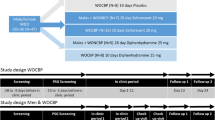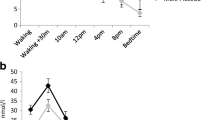Abstract
Background: Electroconvulsive therapy (ECT) is an effective treatment for major depressive illness, even for patients who do not respond to antidepressant drugs. According to the prevailing neurophysiological hypotheses for depression, it can be expected that an ECT therapeutic course modulates the responsivity of central neurotransmitter systems, but the results up to now have been inconclusive. To test such hypotheses, we studied possible changes in the serotonergic and in dopaminergic systems' responsivity in 11 male patients with major depression by performing neuroendocrine challenge tests before and after a therapeutic ECT course. Methods: Serotonergic responsivity was assessed by measuring the prolactin and cortisol responses to i. v. administration of the serotonin uptake inhibitor clomipramine (CMI test), and dopaminergic responsivity by measuring the prolactin responses to the dopamine receptor blocker haloperidol (HAL test), administered intramuscularly. The prolactin and cortisol responses during the first and the last ECT of the course (8 to 13 sessions) were also assessed. The CMI and HAL tests were also performed in 13 male healthy subjects. Results: The prolactin responses to CMI were significantly blunted in the patient group compared to the control group, and remained unaltered at the end of the ECT course, although the depressive symptomatology was substantially reduced from 27.8 ± 7.1 to 4.8 ± 2.3 points in the Hamilton Depression Rating Scale. The cortisol responses to CMI were blunted before the ECT course compared to controls, but not after the course: there was a moderate increase of cortisol at + 30 min in the CMI test after the ECT course compared to that before ECT (p = 0.05). The prolactin and cortisol responses to the electrical stimulus during the first and the last ECT were identical. Conclusions: The strong therapeutic effect of ECT in depression, observed already at the end of the course, is not a result of considerable modifications in central serotonergic or dopaminergic responsivity, as revealed by the neuroendocrine challenge tests and the hormone responses to the electrical stimulus. The enhancement of the cortisol responses to CMI after the course may indicate a moderate increase in 5-HT1A receptor responsivity.
Similar content being viewed by others
Author information
Authors and Affiliations
Additional information
Received: 5 March 2002 / Accepted: 15 July 2002
Rights and permissions
About this article
Cite this article
Markianos, M., Hatzimanolis, J. & Lykouras, L. Serotonergic and dopaminergic neuroendocrine responses of male depressive patients before and after a therapeutic ECT course. European Archives of Psychiatry and Clinical Neurosciences 252, 172–176 (2002). https://doi.org/10.1007/s00406-002-0378-1
Published:
Issue Date:
DOI: https://doi.org/10.1007/s00406-002-0378-1




